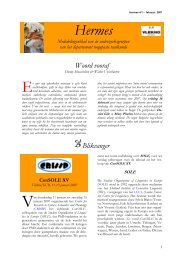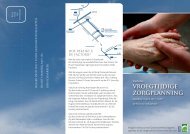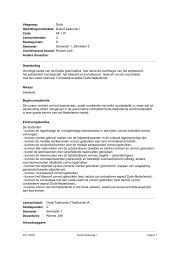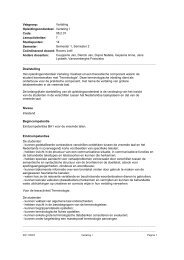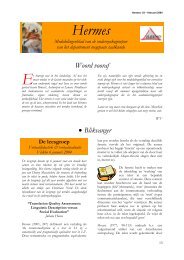HUB RESEARCH PAPER - Hogeschool-Universiteit Brussel
HUB RESEARCH PAPER - Hogeschool-Universiteit Brussel
HUB RESEARCH PAPER - Hogeschool-Universiteit Brussel
Create successful ePaper yourself
Turn your PDF publications into a flip-book with our unique Google optimized e-Paper software.
Process consultation revisited: Taking a relational practice perspective<br />
Process consultation revisited 3<br />
This article acknowledges the pioneering contribution of Edgar Schein in the<br />
development of the laboratory training methodology. Edgar Schein was indeed among the<br />
founders of the ‘laboratory training’ learning method, later called T-group, together with<br />
pioneers such as Kurt Lewin, Kenneth Benne, Leland Bradford, Warren Bennis, Ronald Lippitt,<br />
and, also Chris Argyris (Marrow, 1969). Stimulating reflection on joint here-and-now group<br />
experiences was considered as one of the core processes that made the T-group into an<br />
innovative educational approach. In an autobiographical essay, Schein (1993a) describes his first<br />
T-group experience as “an incredibly potent experience for me that forever changed my view of<br />
the field” (p. 8). From that moment on till present Schein has been focusing on how to build<br />
helping relationships between consultant and client(system). This focus is clearly present in his<br />
work on process consultation (Schein, 1969b, 1999a) and his more recent work on dialogue<br />
(Schein, 1993b, 2003b).<br />
In his seminal work on social change processes Edgar Schein conceptualized the<br />
unfreezing phase in the Lewin change cycle as the outcome of disconforming experiences or lack<br />
of conforming experiences among the actors involved. Throughout their interaction actors<br />
confirm or disconfirm the balance in the triangle ‘self-image’ – ‘perception by others’ –<br />
‘perception of the context’ (Schein, 1969a, 1999b, 2002). Interaction process reflection is<br />
considered to be at the heart of the change process. Beyond the interpersonal and group level,<br />
Edgar Schein extended this discovery into the ‘invention’ of organizational psychology as a<br />
research and practice field. Indeed, Bernie Bass and Edgar Schein wrote the first two textbooks<br />
with the title “Organizational Psychology” (Bass, 1965; Schein, 1965).



